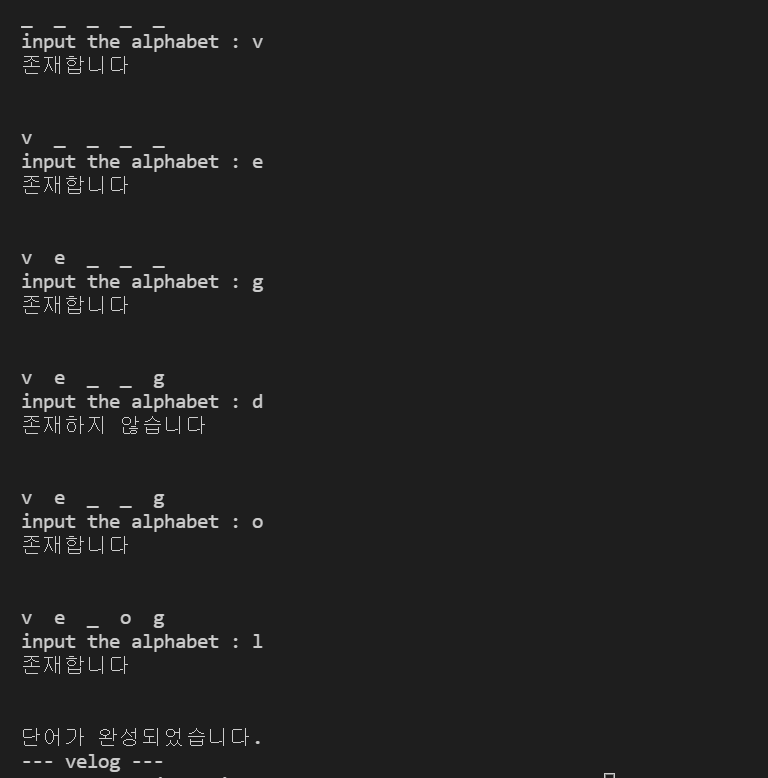지난 글에서 기본적인 class와 함수의 선언이 시작되었다.
이번에는 HangMan.py을 구현해서 game이 실행되는지를 확인해보자
from GameImpl import GameImpl
from User import User
class HangMan(GameImpl):
def __init__(self, user : User):
pass
def getUserName(self):
return self.user.getUserName()
def execute(self):
pass
def gameOver(self):
passHangMan은 임의의 단어 하나를 사용자가 맞추는 게임이다.
게임에 필요한 요소들은 다음과 같다.
1.Game의 정답이될 word (String)
2.user의 현재 상황을 저장할 monitor (List)
- 나의 경우 monitor를 bool형 List로 만들었다.
3.Rank에서 사용될 score, 다만 나는 활용도를 생각해 count(int)로 선언했다.
def __init__(self, user : User):
self.user = user
self.word = "velog"
self.monitor = [False for i in range (len(self.word))]
self.count = 0다음은 execute(self)이다. 사실상 가장 중요한 함수하고 봐도 좋다.
excute함수는 다음과 같이 실행된다.
1.반복조건 : 게임이 끝날조건이 충족될때까지
2.현재 상황 출력
3.알파벳 입력
4.존재합니다 or 존재하지 않습니다. 출력
따라서 나는 다음과 같이 execute를 작성했다.
def execute(self):
while self.isEnd() == False:
self.printMonitor()
self.inputSpell()사용할 함수들을 선언
def isEnd(self):
pass
def printMonitor(self):
pass
def inputSpell(self):
pass선언된 함수들을 만들어 주자
printMonitor(self)는 monitor배열을 참고하며, 각 배열의 요소가 True일때는 word의 index를 출력라고 아닐 경우에는 ' _ '를 출력한다. 또한 줄바꿈을 고려하여 print(end = ' ')를 설정해준다.
def printMonitor(self):
for index in range(len(self.monitor)):
if self.monitor[index] == True:
print(self.word[index], end = ' ')
else:
print('_', end = ' ')inputSpell(self) 는 spelling(char)을 하나 입력 받으며, 입력된 spelling이 word내에 존재할 경우 해당 word내의 index들에 해당하는 모든 monitor의 요소들을 True로 바꿔준다.
또한 위의 작업이 완료 되었을 경우 정답의 여부를 출력해주며, 틀렸을 경우에는 count값을 조정해준다.
- 하나의 함수내에 두가지 기능을 넣는 것은 지양해야하는 부분이지만, 설계능력의 한계로 인해 여기서는 어쩔 수 없이 두가지 기능이 들어가게 되었다(더 좋은 방법이 있다면 댓글 부탁드려요)
def inputSpelling(self):
spelling = input("input the alphabet : ")
is_there = False
for index in range(len(self.word)):
if spelling[0] == self.word[index]:
self.monitor[index] = True;
is_there = True
if is_there:
print("존재합니다\n\n")
else:
print("존재하지 않습니다\n\n")
self.count += 1isEnd(self)는 monitor의 모든 요소가 True라면 True를 반환해준다.
내가 monitor의 배열 요소를 bool로 결정한 이유이다.
def isEnd(self):
if all(self.monitoring):
return True
else:
return FalsegameOver(self)는 후에 수정이 좀 더 필요하지만 우선은 마지막으로 단어를 추가해준다.
def gameOver(self):
print("단어가 완성되었습니다.")
print("---", self.word ,"---")이로써 기본적인 게임의 메커니즘 설계는 끝났다.
Main.py를 일시적으로 수정하고 실행해보자
from HangMan import HangMan
from Rank import Rank
from User import User
if __name__ == "__main__":
ranking_path ="...Python_Hangman/Rank.txt"
#rank = Rank(ranking_path)
user = User()
#user.setName()
game = HangMan(user)
game.execute()
game.gameOver()
'''
rank.addUser(user)
rank.sort()
rank.view()
user.view()
'''정상적으로 동작하는 것을 볼 수 있다.

(임시)완성된 HangMan.py 코드다.
from GameImpl import GameImpl
from User import User
class HangMan(GameImpl):
def __init__(self, user : User):
self.user = user
self.word = "velog"
self.monitor = [False for i in range (len(self.word))]
self.count = 0
def getUserName(self):
return self.user.getUserName()
def execute(self):
while self.isEnd() == False:
self.printMonitor()
print()
self.inputSpelling()
def gameOver(self):
print("단어가 완성되었습니다.")
print("---", self.word ,"---")
self.user
def isEnd(self):
if all(self.monitor):
return True
else:
return False
def printMonitor(self):
for index in range(len(self.monitor)):
if self.monitor[index] == True:
print(self.word[index], end = ' ')
else:
print('_', end = ' ')
def inputSpelling(self):
spelling = input("input the alphabet : ")
is_there = False
for index in range(len(self.word)):
if spelling[0] == self.word[index]:
self.monitor[index] = True;
is_there = True
if is_there:
print("존재합니다\n\n")
else:
print("존재하지 않습니다\n\n")
self.count += 1